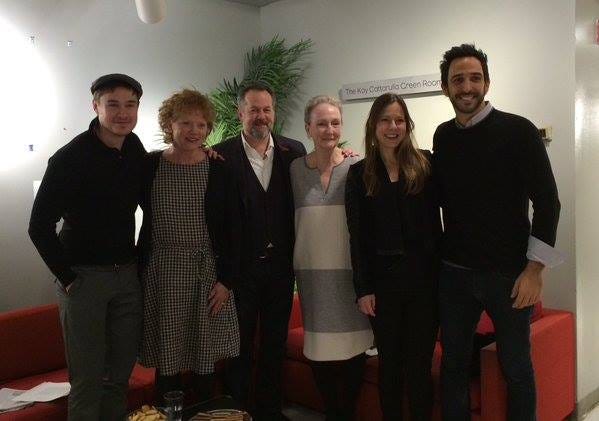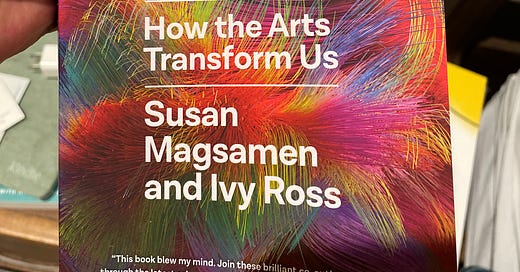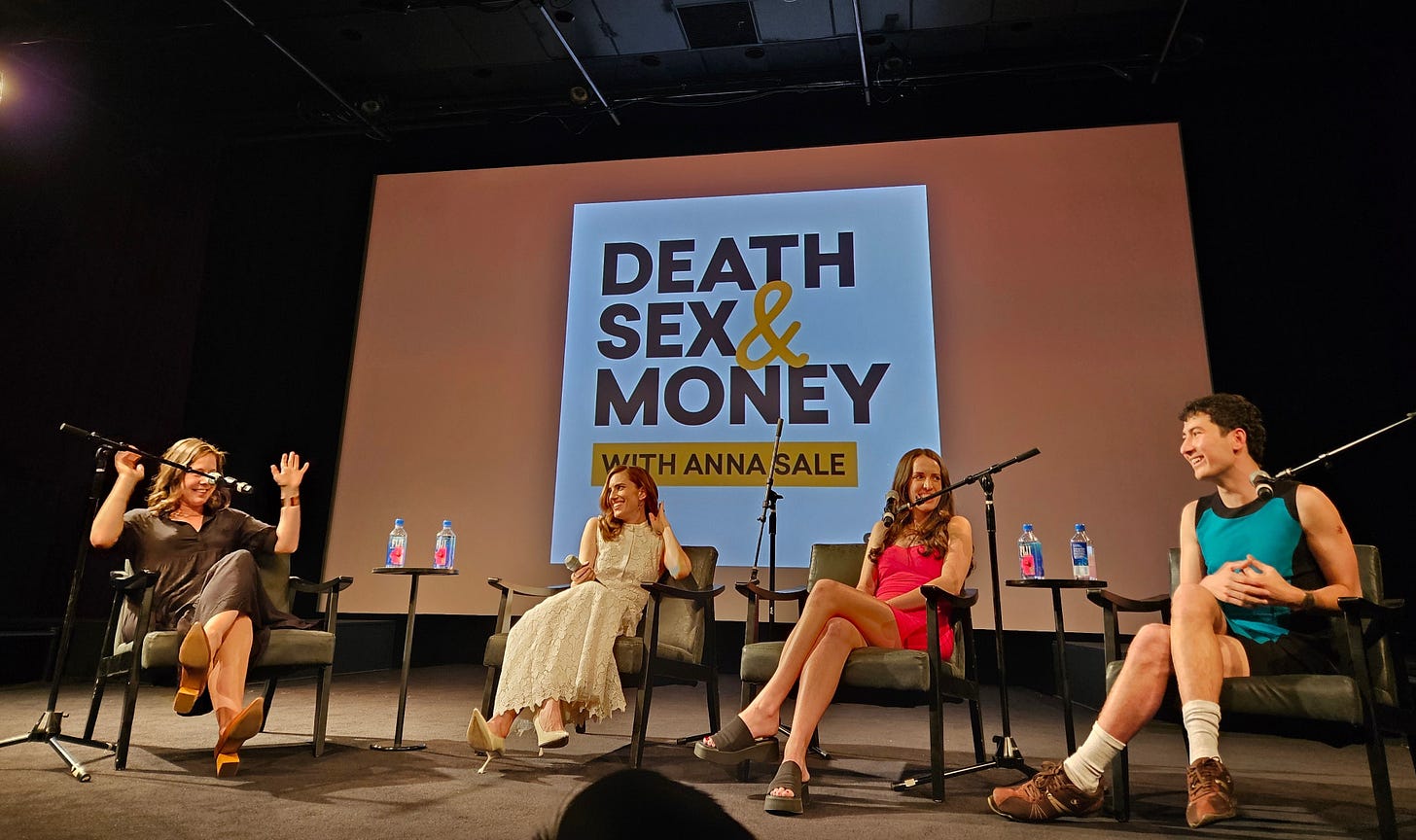This book, Your Brain on Art, was released in paperback earlier this year, making it easy to throw in my purse or camping backpack and burn through in the first weeks of summer.
Its message is simple: our brains are designed to appreciate and make art. When we do, it ignites new connections in our brain. It makes us who we are. Art is how we first show ourselves as individuals when we’re growing up, whether with song, painting, or pretend play. And art is how we collectively define who we are in a community.
Now, it shouldn’t take fMRI images to tell me that entering the flow of appreciating and making art makes life more enjoyable and interesting. But I am someone who has historically linked industriousness with worth — a hard 3 on the Enneagram — so I am served by its message. I can use all available evidence to tell myself that art is not extra or frivolous.
Reading this book has also shifted my mindset around hosting, from a tight anxiety about getting things just right to an appreciation of what can happen when you mix together novel elements and pay attention. You hear that this week in our new episode with Allison Williams and the very funny Gen Z hosts of the Girls Rewatch podcast, Amelia Ritthaler and Evan Lazarus.
On stage at the Tribeca Festival, we had a conversation about coming of age and the yawning gaps that can appear in conversations across generations. We simulated this for our audience with, from left, the journalist in her 40s, the actress in her 30s, and two comedians in their 20s.
There were a few missed references, and different styles of speaking. There were also moments of electricity when someone pointed out another’s generational idiosyncrasies and gently made fun of them.
During my visit to New York for this show, I reflected a lot on earlier versions of myself in the city. I lived in New York in my late 20s through my mid-30s, and during much of that time, the city spilled more from my cup than it let in. I was so hungry for my shot. I tended to eye every interaction, personal and professional, like a hawk scanning a meadow for a slow bunny.
In other words, being surrounded by strivers all the time brought out my inner maniac. I didn’t know when to let up. Seeing everyone making their way amidst the city’s lights could make me feel insecure and grabby.
Maybe it’s my age, or the natural humbling from professional ups and downs, but in New York this time, I looked around with wonder. I told myself, All you have to do is appreciate this place. You don’t need anything from it. It felt like I was taking in art — sometimes absurdist performance art — but art all the same. And I had the best time!
Tell us your personal lines on beauty interventions
Allison Williams and I talked about, among other things, Botox. She described going on and off treatments, depending on her work schedule. She wants full use of her face when she’s acting; when she’s not performing, she told me, “I freeze the fuck out of it.” (On their new podcast Landlines, Allison and her childhood best friends have a popping conversation about the different ways they think about beauty interventions.)
I appreciated how open Allison has been about this, because even though it’s plain to see how many famous faces around us have been enhanced, there’s a lot of silence around it. This makes it feel like the rest of us are on our own, deciding what to do and what not to do.
I discussed this with beauty philosopher Heather Widdows a few weeks ago, and she emphasized that as we become a more image-based culture, our beauty standards are becoming increasingly narrow. What were once considered optional beauty practices are becoming compulsory:
A really good example of, for instance, body hair removal. So as it becomes normalized and naturalized, it becomes something that you can't not do. It
And you can sign to see that that's how the demand ratchets up. And it then, as it becomes global, we've never had a global beauty ideal before. And that really matters because only a global ideal can normalize and naturalize so that the demand goes up and then becomes normal, and then becomes invisible.
At Death, Sex & Money, we are still collecting your stories on how you think about your appearance, the pressure to augment it, or maintain it. We want to hear what parts of this call you’re heeding, and what you’re resisting.
If you have a story about how you think, pay, and talk about your appearance, record a voice memo and send it to us at deathsexmoney@slate.com
Death, Sex & Money in Your Fav Short Stories?
In 2016, Death, Sex & Money collaborated with our friends at Selected Shorts for a program featuring renowned theater performers reading short stories about death, sex, and/or money. You can hear part of that evening here.


We have been invited back to collaborate with Selected Shorts on a show later this year, and I’d like your help putting together the perfect mix of stories. Do you have a favorite short story about death, sex and/or money that we should feature? Tell me in the comments.
Other Recommended Reads, Watches & Listens
-M3GAN. If you missed this campy techno-pessimistic horror movie featuring Allison Williams, watch it before M3GAN 2.0 drops tomorrow.
-There’s an incredible exhibit of photographs by wildland firefighter and photographer Kyle Miller at the Buffalo Bill Center of the West in Cody, Wyoming. You can see more of the pictures Kyle’s taken while working on Instagram.
-My favorite go-to comedy podcast, Handsome, is sweet and thought-provoking this week about love between parents and their kids. Fortune Feimster updates us about accompanying her mother through early cancer treatment, and Tig Notaro describes a surprise emotional wallop that hit after she started talking about her dad on a morning walk.
-Men of a Certain Age, a TV show about midlife that ran from 2009 to 2011 and starred Ray Romano, Andre Braugher, and Scott Bakula, is on Max. Braugher’s performance, in particular, is fantastic—he was nominated for two Emmys for the role.
Until next week,
Anna
This newsletter is free to you, but let me urge you to support the Death, Sex & Money team by becoming a member of Slate Plus. What do you get? Ad-free listening and special member-exclusive podcast drops. Please join us at slate.com/dsmplus or through Apple Podcasts or Spotify.
Listen to our latest Death, Sex & Money episodes
6/24 Allison Williams on Botox, Privilege, and Gen Z’s Love of Marnie From Girls
6/17 How Much Can Your Love Life Change in One Summer?
6/17 Bonus: Should A Mostly White High School Perform The Wiz? (Apple|Spotify|Slate)
6/10 Money Advice For This Weird Moment
6/3 How a Matchmaking Job Inspired a Film About Dating’s Secret Economy
6/3 Bonus: How Much Would You Give Up to Be More Attractive? (Apple|Spotify|Slate)
5/27 Betraying a Friendship to Get a Viral Story
5/27 Bonus: Big Tech and the Rise of the “Do Nothing” Middle Manager (Apple|Spotify|Slate)
5/20 Why Chef José Andrés Googled ‘How to Be a Father’





